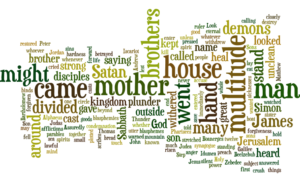The Ministry of Jesus in Galilee
Mark 1:16—8:30
A New King (1:16—3:6).
Kingdom is Near (1:15)
Popularity (1:16-45).
Conflict (2:1—3:6).
Forgiving and Healing a Paralytic (2:1-12).
Eating with Tax Collectors and Sinners (2:13-17).
Fasting (2:18-22).
Lord of the Sabbath (2:23—3:6).

Working on the Sabbath (2:23-28).
It is important to note the laws concerning the Sabbath.
Several traditions developed around the Sabbath.
Knowing all this, did Jesus and His disciples sin here? (2:23-24).
Jesus brings up an example from the OT to justify His actions (2:25-26).
Another important principle (2:27).
The purpose of these ceremonial rituals is not so that man can be a slave to them, or especially to the traditions built around them.
The purpose of these things is to serve man.
Our needs come before ritual obedience.
Can that be abused? Yes!
Let us make every effort to obey our Lord—exceptions should be rare.
It’s not every day that David ate the showbread.
We don’t know how often Jesus and His disciples plucked grain on the Sabbath, but it does not seem like a regular occurrence.
Lord of the Sabbath (2:28).
SDA love this verse—they seem to think it indicates that we should still follow the Sabbath and its regulations.
What does it really mean for Jesus to be Lord of the Sabbath?
He is in charge of the Sabbath.
He, in His unique position as God, Creator, and Messiah, “understands [the Sabbath’s] intentions, sees its limitations, and knows what violates its purpose” (Stauffer 64).
He recognizes the spirit of the law even if it violates the letter, and He, as the Son of Man, can make that determination.
Healing on the Sabbath (3:1-6).

Jesus worships in the synagogue on another Sabbath and encounters a man with a withered hand (3:1-2).
It is likely the Pharisees were trying to set Jesus up, “that they might accuse Him”—they wanted to charge Him formally.
Their dislike of Him must have reached a fever pitch to get them to try something like this.
What laws or traditions could possibly exist that covered healing of the nature that Jesus was capable of performing?
In the synagogue, often members of the Sanhedrin would sit in the front to make sure sound doctrine was being taught.
Can’t blame them, but this time Jesus reveals their motives to be sinister.
He tells the man to step forward, to “arise in the midst” (3:3-4).

He no doubt sense their thoughts (Matthew records that they asked Him directly), and so He responds.
He asks if it’s lawful to do good or evil, to save life or kill, and they are speechless.
What evil was Jesus talking about here? What killing?
It could be construed that Jesus would have done evil had He let the man’s withered hand remain that way any longer, but the condition was not life-threatening. His inaction that day would not have resulted in the man’s death.
Jesus revealed that their plotting against Him to have Him executed was not lawful on the Sabbath (or really ever, but definitely not on the Sabbath)—they were the ones truly in the wrong and they knew it.
Jesus heals him in the face of their hard hearts (3:5).
Imagine being a witness of such miraculous deeds, and having such a hard heart that you would plot to have the Healer put to death!
Jesus was sad and angry at their bold defiance—characteristic of many prophets of old.
He heals the man, but the Pharisees could not accuse Him like they planned because of His unassailable logic.
Pharisees and Herodians plot together (3:6).
Who are the Herodians? Not much is known about them. They are mentioned once in Josephus and two other times in the Bible, both of the same event involved in trying to trick Jesus concerning taxes (12:13; Matt. 22:16). They are presumed to be supporters of the Herods and allies of Rome.
The Pharisees were Jewish patriots and were working with allies of Rome showing their great hatred for Jesus—the enemy of my enemy …
This is the culmination of this section on conflict, ending with the plotting of His destruction.
Jewish Leaders Reject Him (3:6)


